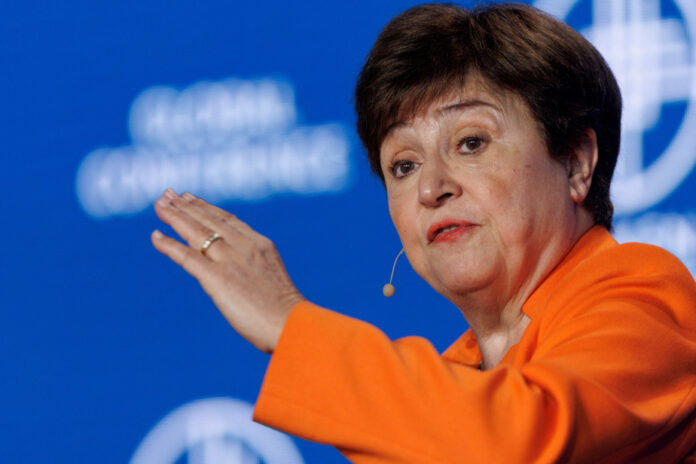(Washington) IMF Managing Director Kristalina Georgieva on Friday called for “as soon as possible a resolution” to the US debt ceiling negotiations, saying finding a solution was “critical” for the global economy.
The boss of the International Monetary Fund was speaking at a press conference after the publication of a report on American economic activity, on the occasion of which the institution revised its growth forecasts slightly up .
Recalling US Treasury Secretary Janet Yellen’s call for a “quick resolution” on the matter, Ms. Georgieva said she “shares this expectation.” We are very keen to see a resolution as soon as possible.”
“We have to remember that we entered the last quarter of an hour, so to finish with a positive result is paramount, from a global point of view,” Ms Georgieva added.
The boss of the Fund, however, stressed that, for the moment, the impact on the financial markets remained minimal, due to a certain habituation to this type of situation.
“Experience tells us that it often takes going to the limit to find a solution” on the US debt ceiling, citing “relative calm.” We’ve seen some movement in niche markets, but it’s not something significant at the moment.”
The fact remains that the United States is too indebted, according to the IMF, which, in its report, calls on the country to make “a significant adjustment in order to place public debt on a downward trend by the end of of this decade”.
“More needs to be done to reduce the public debt,” said Ms. Georgieva, which must go through “a series of measures aimed at both increasing tax revenues and addressing structural imbalances in programs such as Medicare.” or retirement”.
In its report, the IMF revised its growth forecast for the United States slightly upwards in 2023, now counting on 1.7% against 1.6% expected in April.
“The US economy has shown resilience despite the significant tightening of monetary and fiscal policies made in 2022,” said the institution, which nevertheless underlines that “inflation remains a persistent problem”.
The Fund indeed expects core inflation, which excludes food and energy prices, to “remain significantly above the 2% target in 2023 and 2024”, which should cause US central bank (Fed) interest rates to stay between 5.25% and 5.5% “until the end of 2024”.
PCE inflation, the Fed’s preferred inflation, is expected to reach 3.8% at the end of 2023 and 2.6% at the end of 2024, which is higher than previous forecasts, in April.
In a statement, U.S. Treasury Secretary Janet Yellen noted “the resilience of the U.S. economy in the face of global challenges and the progress […] made in the past year to reduce inflation and maintain a solid work.”
The IMF indeed points to the strength of the US job market, with a “economic participation rate higher than pre-pandemic levels” as well as a “historically low unemployment rate for women and African-Americans”. Americans”, two groups generally more affected by unemployment.
The institution also recognizes the efforts made in 2021 to reduce poverty, in particular through an increase in wages for low-income people, leading to a significant drop in the poverty rate, from 11.8% in 2019 to 7.8 % in 2021.
However, the trend was partially reversed in 2022, due to the end of the aid put in place during the pandemic, but also under the effect of inflation, which reduces the positive impact of salary increases.















